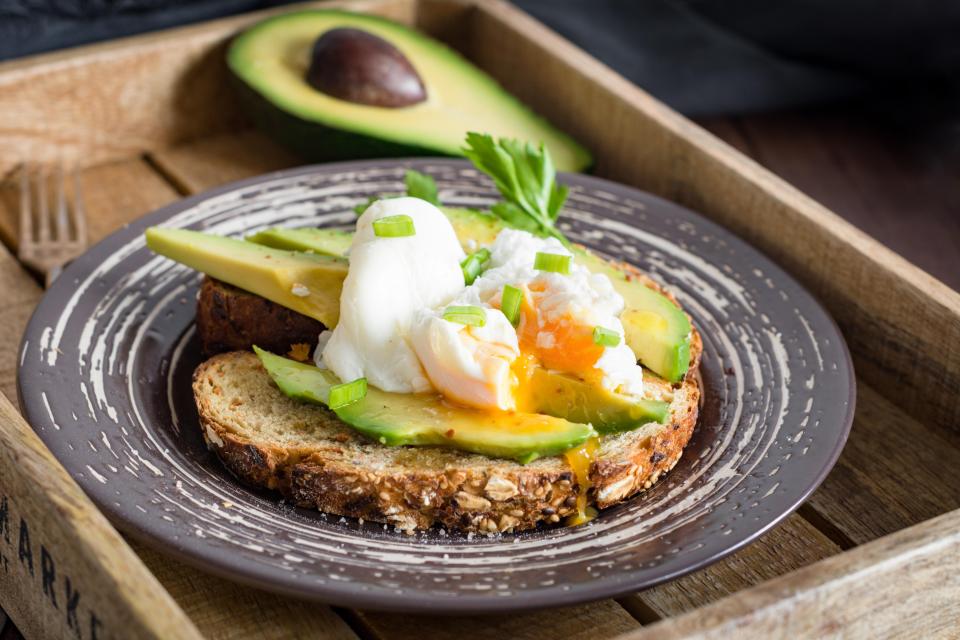COULD your breakfast be the key to weight loss?
The path to shedding pounds is different for everyone - just because one method worked wonders for a friend, doesn't mean you'll see the same results.
Now, a new study suggests that how you start your day could help kick-start weight loss - and the amount of calories you consume for your first meal is key.
Dieters should aim to consume between 20 to 30 per cent of their daily calorie intake at breakfast, Spanish researchers said.
They found those who ate the "sweet spot" of calories at breakfast - between 500-750 calories for men and 400-600 for women - had a lower body mass index (BMI) than those who ate too little or too much.
A hefty full English would tip most people over this calorie mark, while yoghurt and fruit might pack too small of a punch to keep you satisfied till lunch, researchers said.
Read more on breakfast
Their findings are in line with previous research showing that, if you're looking to lose weight, you choice of breakfast foods may also depend on your gender.
The study, published in the journal , builds on previous studies to suggest that men and women metabolise certain foods differently.
It found that a man's metabolism tends to respond better to meals high in carbs after fasting - going without food - for several hours, as you would be before eating breakfast.
Meanwhile, women seemed to metabolise meals with high levels of fat better.
Most read in Diet & Nutrition
Carby breakfasts can include foods like like oats and grains, while those rich in fat can incorporate foods like eggs and avocados.
The study looked at how the metabolism responded to two meal compositions: high-carb meals with 90 of caloric intake from carbohydrates and 10 per from fat, and a high-fat meals where half of the calories came from carbs and half from fat.
It’s important to point out that the study didn’t ask men and women to eat different foods to see how much weight they lost.
To reach these findings, scientists used mathematical models to mimic how men and women's metabolisms might work, in order to determine what type of breakfast they might benefit from.
Researchers also only looked at meals combining carbohydrates and fat, excluding protein from their analysis.
They theorised that men and women respond to fat and carbs differently is due to muscle mass and hormonal differences.
Responding to the study, registered dietitian Lucy Diamond said there isn't a one-size-fits-all formula when it comes to nutrition and there are a number of things you can take into account to personalise your diet.
This of course includes food preferences, as well as you age, how active you are throughout the day, health conditions, genetics - and your gender.
"When considering gender, we need to think about this not only from a calorie perspective, but a macros perspective," the clinical director for innovation at NHS weight management provider, , told Sun Health.
"Macros is short for macronutrients, which are the essential nutrients your body needs in large amounts to function: carbohydrates, protein and fats."
Lucy added that previous studies support the theory that men and women metabolise different foods better.
"This research contributes to the growing body of evidence that sex-specific approaches to metabolic health may be beneficial in personalising nutrition and exercise recommendations," she said.
According to the dietitian, tailoring your meals specifically to your gender can help "align with natural hormonal patterns and metabolic processes", which in turn can help with weight management.
She explained: "Men often benefit from more carbohydrates to support their typically higher muscle mass and faster metabolism."
But it's important that you reach for wholegrains and carbs with a low glycaemic index (GI) - meaning that they raise blood sugar levels slowly.
The GI of foods is an important factor to consider if you're diabetic
"As a general rule, most fruits and vegetables, beans, minimally processed grains, pasta, low-fat dairy foods, and nuts are low GI," Lucy said.
How to tell if your breakfast is working for you
If you give these gender-tailored brekkies a go, Lucy recommended you "pay attention to how your body responds and adjust accordingly".
Key signs that your breakfast is well suited to your needs include:
- Sustained energy levels until lunch
- Good concentration throughout the morning
- Feeling satisfied but not overly full
"Remember, sustainable weight loss isn't about quick fixes, but rather finding healthy habits that you can maintain long-term," Lucy added.
She went on: "Women may find that higher fat breakfasts help regulate hormones and control hunger throughout the day.
"When thinking about fats, you want to ensure these are good fats (i.e. unsaturated).
"This includes the avocados, nuts and nut butter in the breakfast ideas, as well as oils from vegetables, nuts and seeds and oily fish."
But the dietitian stressed: "It's important note that these are guidelines.
"What works perfectly for one person might not suit another, even within the same gender group."
Best breakfasts for women
As women's hormones and body composition are different, Lucy recommended a breakfast higher in healthy fats to help with hormone regulation and keep you feeling full.
"Women often process fats more efficiently and may benefit from fewer carbs in the morning," she explained.
Here are some options you could go for:
- Scrambled eggs with half a mashed avocado on sourdough bread, topped with cherry tomatoes and a sprinkle of seeds. The combination of healthy fats helps support hormone production and maintains stable blood sugar levels.
- Full-fat Greek yogurt topped with a small handful of mixed berries, two tablespoons of mixed nuts, pumpkin seeds, and a teaspoon of chia seeds. This provides healthy fats and protein while keeping carbs moderate.
- A blend of coconut milk, a small portion of berries, a tablespoon of almond butter, a scoop of protein powder, and a handful of spinach. This combination provides healthy fats while keeping sugar content lower.
Best breakfasts for men
Meanwhile, men will typically have more muscle mass and a faster metabolic rate.
As a result, eating carbohydrate-rich breakfasts can provide the energy they need to kick-start their metabolism, Lucy said.
"Their bodies often process carbohydrates more efficiently, especially in the morning," she added.
Read More on The Sun
Here some breakfast options to give a go:
- A bowl of oats made with milk, topped with a sliced banana, a handful of mixed nuts, and a drizzle of honey. This type of breakfast provides sustained energy and keeps you fuller for longer.
- Wholegrain toast topped with two scrambled eggs and a generous portion of baked beans. This provides complex carbs for a steady release of energy, along with protein for muscle maintenance.
- A large serving of Greek yogurt mixed with protein-rich granola, a handful of mixed berries, and honey. This delivers both quick and slow-release energy, plus protein through the yoghurt.
How many calories should I be eating daily?
To stay at around the same weight, the calories your body uses should be the same as the amount of calories you eat and drink.
How may calories you consume daily will depend on your age, weight, height and how much exercise you do.
But, on average:
- Men need about 2,500kcal a day
- Women need about 2,000kcal a day
You can keep track of your calories by checking labels on food packaging for calorie information – this will be displayed under the "energy" heading.
Restaurant and takeaway menus will also have this information.
Planning your meals ahead will give you a better idea of how many calories you're consuming.
Sticking to a balanced diet can help you stay within calorie thresholds.
You can get healthy calories from eating a diet that includes fruit and vegetables, starchy foods, protein and unsaturated fats, the NHS says.
Source: NHS












